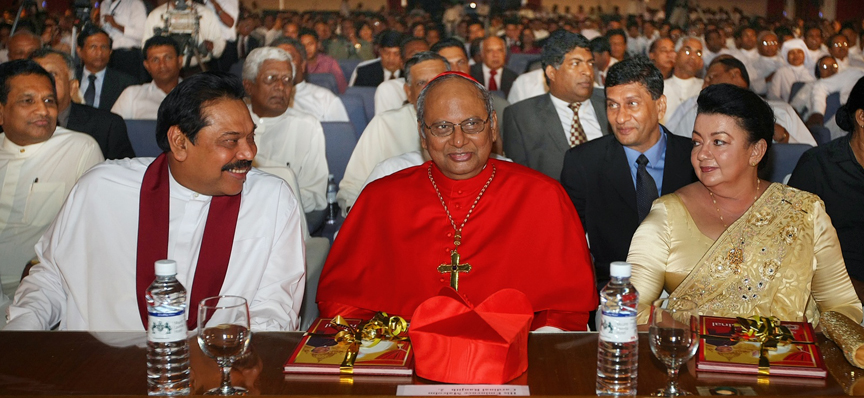
Sri Lanka’s Archbishop of Colombo delivered a statement at the United Nations Human Rights Council in Geneva last week, where he called for an investigation into the Easter Sunday attacks and – for the first time – spoke of accountability “for the atrocities in the North-East.”
“We remain concerned over the failure of a transparent, independent, and accountability process for victims of the terror attacks on Easter Sunday as well as the atrocities in the North-East,” he said Cardinal Malcolm Ranjith, a former Rajapaksa ally.
“The 21st of April will mark 5 years since the Easter Sunday attacks were carried out. Since then, all the governments that ruled the country conducted several investigations which fell far short of going into all the details of the case and brushed aside new evidence.”
He went on to state that their requests and pleas for a transparent investigation continued to be “denied by the government of Sri Lanka.”
The Cardinal went on to state this “situation has become worse with the government making dictatorial and undemocratic moves to introduce new laws curtailing media freedom, subjective definition of terrorism that can lead to arbitrary arrests, extended jail terms for those clamouring for justice and for those calling for transparent investigations into murders, disappearances and excesses in the past”.
Ranjith has long rallied for an independent mechanism to deliver justice for the Easter Sunday attacks of 2019. However when it came to the genocide of Tamils and the massacres of 2009, he had been much more defensive.
The Cardinal has been widely criticised for his lack of concern about the plight of Tamil priests, arrested by the military in Mullivaykal in May 2009 and has been accused of supporting the government’s land grabbing and militarisation.
In 2012, as Bishop of Mannar, Rayappu Joseph and other members of the wrote to the UN Human Rights Council, Cardinal Ranjith said the Catholic Church in Sri Lanka rejected any moves for an international accountability mechanism and claimed "such efforts by western powers is an insult on the intelligence of the people of Sri Lanka".
In 2013, Ranjith, slammed any notion of foreign intervention in Sri Lanka, writing
"Foreigners should not tell us what to do... We are not a pack of fools".
Later that year he said neither he nor any of the bishops on the island will indulge in politics or affiliate themselves with a political party or group
In 2014, as Catholic bishops called for an international investigation into Sri Lanka’s use of cluster bombs and chemical weapons against Tamil civilians in a meeting with US officials, Ranjith said the Catholic Church in Sri Lanka did not support those allegations.
In 2015, he called for a review of parties based on ethnic and religious lines, saying they were “inimical” to social cohesion.
The ethnically Sinhalese archbishop has also defended the Buddhist nature of Sri Lanka, stating,
"The prominence of the country relies on Buddhism and there should not be any decision to change its due place secured by the constitution as we all live in a country nourished by Buddhism".
Last year, he called upon Sri Lanka’s political leaders to follow and safeguard Buddhism.
He maintained that Sri Lanka is a nation “rooted in Sinhala Buddhist traditions” and described those who failed to recognise this as “foolish”. Malcolm Ranjith also warned political leaders against disregarding the will of the Buddhist Sangha.
The statement followed Ranjith’s call for a ban on all political parties “based on religion and language,” a move that has previously been proposed by Sri Lanka’s prime minister and one that may have dire consequences for the island’s Tamils and Muslims.
Besides from being seen as an apologist for the Sri Lankan state and the Rajapaksa’s in particular, Ranjith’s address to the UN Human Rights Council is remarkably different from his previous views on human rights.
See an excerpt from a 2018 address delivered by the archbishop below.
“Human rights have become the new religion in the Western world. In the past, there was no such thing as human rights but people lived with love and respect and trust in God. This is like a wonderful new discovery they keep in mind and they always tell us that. Religion in European countries often referred to as human rights, is like wearing a coat. Somewhat which you can wear when you need it and throw it away when you don’t need it. Religion is practiced when an advantage is needed and religion is discarded when a sacrifice is needed. This is spreading in our country as well. Some of them are talking about a secular society. There is no secular society. People’s lives are not limited to food, clothing, and comfort. If we believe in religion, we do not need to talk about human rights. We can live beyond human rights. The religions we believe in have human rights. What else is needed? So dear brothers and sisters, we should not be deceived by this magic. We must act wisely here.”
